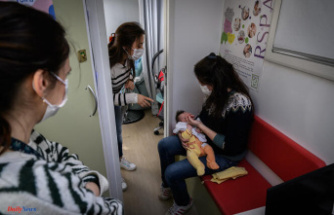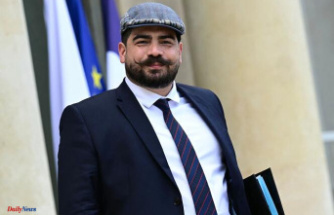Guest of the 8 p.m. news on TF1 and France 2, President Emmanuel Macron was expected to discuss the challenges of the start of the school year, from inflation to immigration after a busy week, marked by the visit of Charles III and Pope Francis. On the eve of the presentation of ecological planning and before that of the budget on Wednesday, the president made several announcements concerning purchasing power, ecology and even Niger. We take stock of what to remember.
Asked about the price of fuel, Emmanuel Macron announced on Sunday that the government was giving up authorizing the loss-making sale of fuel, which Elisabeth Borne had announced a week ago, and is asking distributors to “sell at cost”. “The threat of lowering the threshold for selling at a loss has been made. It will not be in Wednesday's text (in the Council of Ministers, Editor's note). We keep it as a threat,” declared Emmanuel Macron on France 2 and TF1, adding that the Prime Minister was going to “bring together all the players in the sector this week” to “ask them to do things at cost.”
To compensate for the high price of fuel, he mentioned new aid, “limited to workers” and the poorest, and which could reach “100 euros per car per year”. It is “limited but much more relevant”, because it will be aimed at “people who work and who need to ride”, and will not go beyond half of French people who earn the least, specified the head of state, explaining that he had asked the government to develop this system.
Emmanuel Macron announced on Sunday that the “60 largest agri-food manufacturers” were going to be brought together around a negotiating table in order to agree on an agreement limiting their margins.
“We have large groups who have raised the prices of some of their brands and so we want to put them back at the table,” he said. “We are going to put in place, and I will personally see to it, an agreement on the moderation of margins in the sector”, with “controllers” who will carry out checks, he added.
French President Emmanuel Macron announced on Sunday evening the return "in the coming hours" of the French ambassador to Niamey, and the departure of French troops by the end of the year, following an arm's length two-month standoff with the Nigerien junta. “France has decided to bring back its ambassador,” whom Paris has so far refused to recall, and “we are ending our military cooperation with Niger,” declared Emmanuel Macron, indicating that the 1,500 French soldiers would leave “within the weeks and the coming months” and that the withdrawal would be completely completed “by the end of the year”.
On the eve of detailing ecological planning at the Elysée, Emmanuel Macron announced that “we will not prohibit” the installation of new gas boilers, “because we cannot let our compatriots, in particular in the most rural areas, with no solution.” The measure had been considered for a time by the executive. But the Head of State also pleaded to “support households to equip themselves with heat pumps, because heat pumps are intelligent, they save energy and they greatly reduce emissions ".
Concerning the exit from coal, he wanted France to exit it by 2027, by converting its last two power stations. “The first thing, and this is the fight we must wage for the country and internationally, we must get out of coal, it is a fossil fuel and the most polluting,” he explained. “By 2027, what are we going to do? We still have two coal-fired power plants, Cordemais and Saint-Avold, we are going to completely convert them to biomass,” he said.
Emmanuel Macron estimated that France was doing "its part" in terms of welcoming migrants, in response to Pope Francis who had in recent days in Marseille had very harsh words on this subject towards European leaders. “The Pope is right to call for this surge against indifference”, but “we cannot accommodate all the misery in the world”, he added, using the famous phrase of the former socialist Prime Minister Michel Rocard.
“We must have a consistent approach with the countries of origin. Europe must play as a group,” he added. The President of the Republic wants to propose to the European Union to “put more resources into transit countries, to offer them partnerships to avoid departures, because this is where people take all the risks in Mediterranean”.
On the domestic front, Emmanuel Macron pleaded for the immigration bill which will be examined in early November in the Senate to be the subject of an "intelligent compromise", particularly on the controversial subject of regularization of undocumented immigrants for professions in shortage. .
French President Emmanuel Macron expressed concern on Sunday evening about a possible military offensive by Azerbaijan against Armenia, stressing that Baku “threatens” the common border and “territorial integrity” of this country.
“France is very vigilant about the territorial integrity of Armenia because that is what is at stake,” he said on TF1 and France 2. “Today we have a Russia which is complicit in "Azerbaijan, a Turkey which has always been in support of these maneuvers and a power which is uninhibited and which threatens the border of Armenia", he said, after the lightning victory of Baku against the separatists of Nagorno Karabakh , a territory predominantly populated by Armenians.












